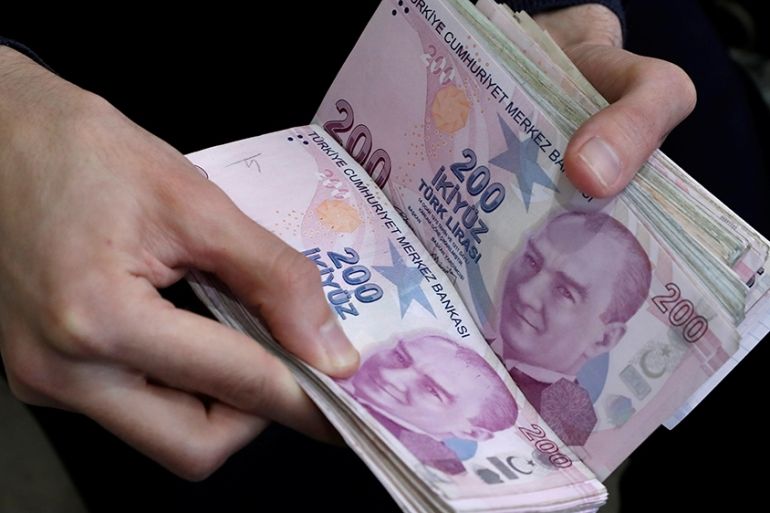Turkish lira slides further on Idlib worries
Analyst warns measures by Turkish banking authorities to prop up lira ‘can’t continue for much longer’.

Pressure continues to pile on the Turkish lira, with the currency weakening some 0.6 percent against the dollar on Tuesday as investors grow increasingly concerned about an escalation of violence between Syrian government forces and Turkish forces in northwest Syria.
An attack by Syrian government forces killed five Turkish soldiers in northwest Syria on Monday, threatening further escalation in the region after another deadly artillery strike last week.
Keep reading
list of 3 itemsTurkey’s central bank surprises with another deep rate cut
Bye-bye, recession: Turkey’s economy returns to growth
Turkish defence officials on Tuesday said five other troops were wounded in “intense” shelling in Taftanaz in the northwestern province of Idlib, the last rebel-held stronghold in Syria.
Concerns over Turkey’s increased military involvement in Syria have been weighing on the lira, said Jason Tuvey, senior emerging markets economist at Capital Economics.
“The latest developments certainly raised concern that tensions will continue to flare up,” said Tuvey.
On Tuesday, the lira weakened as far as 6.04250 against the dollar from Monday’s close of 6.0075.
The Turkish currency had declined to 6.05 on Friday- its weakest point in regular trading since late May – but recovered briefly on Monday after Turkey‘s banking regulators imposed new limits on foreigners’ ability to borrow lira and bet against it.
Turkish state banks have sold tens of billions of dollars over the last year to stabilise the lira, which lost some 36 percent of its value in the two years following a currency crisis in 2018.
Bloomberg News, citing three traders with knowledge of the matter, reported on Tuesday that government-backed lenders have sold around $500m this week defending the lira.
Such interventionist measures by authorities can buoy a currency against market forces. But Capital Economics Tuvey believes such measures are not sustainable.
“The Turkish authorities have kept a tight grip on the lira in recent weeks but we don’t think that this can continue for much longer and expect the currency to fall by 20% against the dollar by end-2020,” Tuvey wrote in a research note to clients on Monday, adding that “The longer that policymakers intervene to prop up the lira, the greater the risk of a disorderly adjustment.”
Turkey’s central bank has aggressively slashed its benchmark interest rate since last July. It now stands at 11.25 percent and inflation has been accelerating in recent months.
Lower interest rates tend to weaken a currency and stoke inflation but such measure can spur economic growth by making it cheaper for consumers and businesses to borrow money to expand consumption and production.
In December, Turkish President Recep Tayyip Erdogan told state broadcaster TRT Haber that the country would attain single-digit interest rates and inflation in 2020.